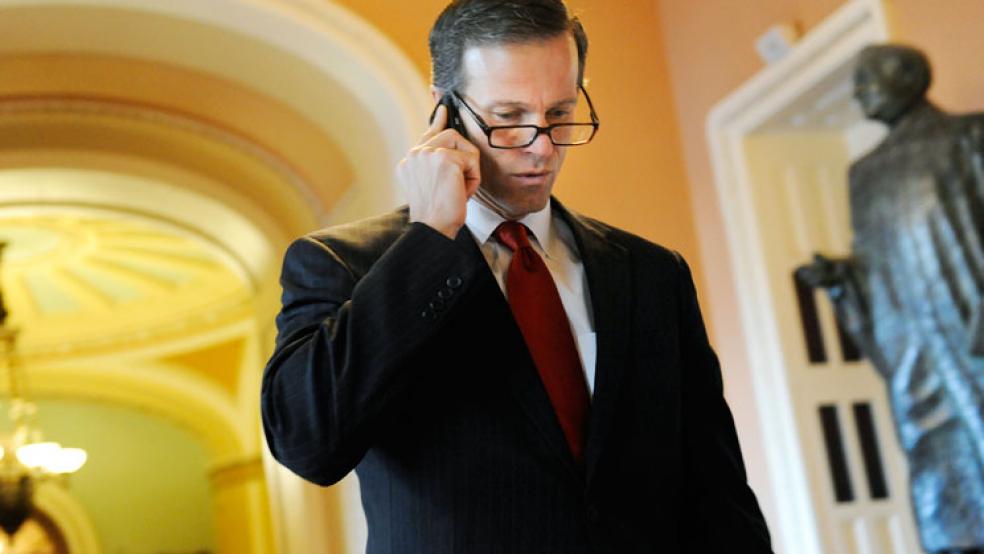Sen. John Thune (R-SD) is in a bind: If the federal Highway Trust Fund goes bankrupt next month, as many fear it will, dozens of highway and bridge construction projects in his state would be canceled – delivering a blow to the South Dakota economy.
Six percent of the state’s major roads and highways are in poor condition, while 25 percent of its bridges are deficient or functionally obsolete, according to one assessment. South Dakota motorists are hit annually with $206 million in extra vehicle repairs and operating costs because of damage from potholes and tough terrain – an average of $339 per motorist.
Related: GOP Targets ‘Double Dippers’ to Pay for Highway Bill
Thune, a leading spokesperson for congressional Republicans in the battle over reauthorizing the multibillion dollar highway and transit program, may have to block a deal if it doesn’t meet GOP demands for offsetting cuts in government programs.
Lawmakers have given up on passing legislation to extend highway and transit spending for the next six years. Instead, most agree Congress must pass a short-term, six-month extension of spending authority to prevent the trust fund from running dry later this summer.
Senate Finance Committee Chairman Ron Wyden (D-OR) and other Democrats have offered ways to raise about $8 billion to offset the cost of a six-month package – postponing the crisis until after the November elections. But Thune and GOP colleagues want to reduce spending – including on Social Security disability payments and unemployment insurance.
Related: Why You’ll Need a Tank to Drive America’s Highways
These Republican proposals reflect the party’s concern about the cost of people ‘double dipping’ on the two programs. There’s no law against it, but GOP policymakers say it’s time to reexamine the programs: The number of Americans collecting both unemployment and disability insurance has risen dramatically.
Thune’s main target is the roughly 117,000 Americans who double-dipped by cashing unemployment and Social Security disability checks – costing taxpayers $856 million in fiscal 2010 alone, said a Sept. 2012 Government Accountability Office report.
He is also promoting an idea to offset part of the highway bill with royalties from opening more federal land to oil and gas exploration – although that could hardly be worked out in just a few weeks, if ever.
“The last thing any of us here want are for state transportation departments and contractors to be left holding the bag come August, so I appreciate Chairman Wyden’s interest in acting as quickly as possible to find the funding necessary to ensure the solvency of the Highway Trust Fund in the short-term,” Thune said during a Thursday meeting of the Finance Committee. Any package should “include reasonable spending reforms,” he added.
Related: 700,000 Jobs at Risk If Highway Trust Fund Falters
Thune, 53, is considered a rising GOP star and an important lieutenant to Senate Minority Leader Mitch McConnell (R-KY). Thune broke onto the national scene in 2004 by challenging and defeating Democratic Senate Minority Leader Tom Daschle. In Dec. 2006, Thune became the GOP’s chief deputy whip and moved up to Republican Conference Chairman, the third-ranking leadership post.
After Thursday’s Finance Committee meeting, The Fiscal Times spoke to Thune:
Eric Pianin (EP): Where do talks over a short-term highway bill stand?
John Thune (JT): Republicans want to offset the amount of money we need to keep the trust fund stable for another six months – about $10 billion – and to accomplish that through spending reforms. There is some support in the House for using revenues from energy exploration of federal lands. That’s included in our plan.
The Dems, of course, are doing it all on the tax side and they’ve got a couple of provisions – the stretch IRA, for example – which is a big revenue raiser and something our guys won’t vote for. It’s a tax increase that would impact a lot of people. We’re trying to fashion something that would take out the tax increases. There are a couple of tax compliance provisions that make sense, coupled with spending reforms for a package we think could get bipartisan support.
Related: Americans Face a Bumpy Road As Highway Bill Stalls
EP: What about cooperation from House Republicans?
JT: They like the idea of energy exploration on federal lands and using royalties from that to fund it, but in the near term they have a proposal to go from six days [of postal delivery] to five [using the savings for the highway trust fund]. I think they’ve ditched that idea, so I’m not sure what the current state of thinking is. I don’t want to see us add the cost to the debt – to do a general fund transfer that simply moves money from one account to another and then borrows it.
EP: Isn’t the plan to finance highway spending with energy production royalties a long shot that could take a year or more to work out?
JT: Yes. We’ve got just weeks to get this all done. Something would need to change dramatically to be able to get this [energy royalty idea] implemented quickly – but I think it warrants consideration when we look at the long term reauthorization.
EP: What does this controversy mean to your state?
JT: Our state is incredibly dependent on the trust fund to [support] infrastructure. We have vast areas of geography and a lot of highways. Our state highway department, contractors, business community, and others are going to be very upset if Congress doesn’t take steps to provide some certainty – especially now, during construction season. If you shut it down now, a lot of stuff won’t get done until next summer. We’re very concerned.
Top Reads from The Fiscal Times:





